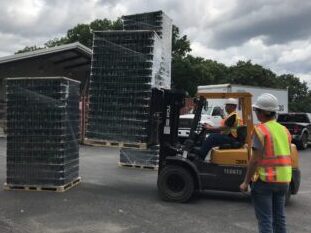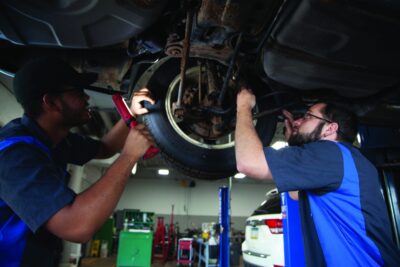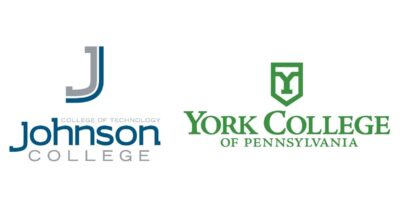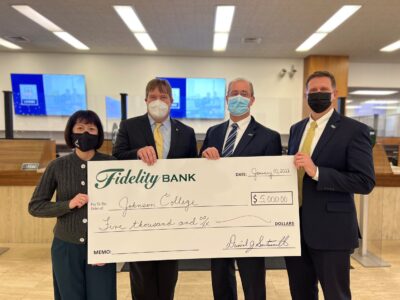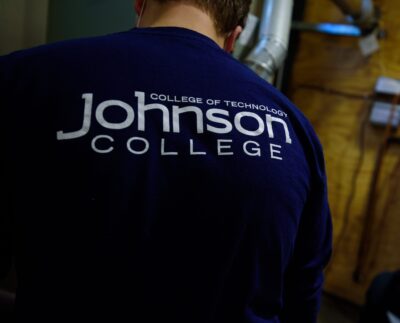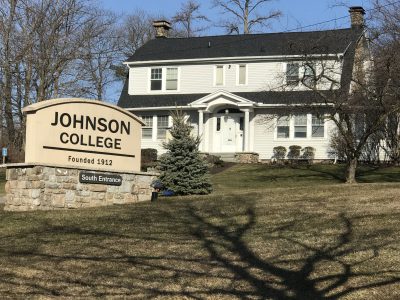By Dr. Meg Varner-Soden, Johnson College’s Veterinary Nursing Instructor
Originally published in the January 28, 2022 edition of the Valley Advantage.
We’re starting 2022 with a new pets column to help keep your pets healthy and safe. This month, Johnson College’s Dr. Meg Varner-Soden, DVM, talks about some winter hazards that can harm your pets and what we need to do when they’re exposed to them. Let’s get started.
Ice melts
These products are typically made of salt, like potassium chloride or calcium chloride. Their purpose is to lower the freezing point of water to reduce ice formation on sidewalks and provide more traction.
Our dogs and outdoor cats are at risk of developing irritation of the paw pads, or the webbing of the skin between them, when coming into prolonged contact with these salts. They are also at risk of ingesting them — for example, licking their feet upon coming indoors, eating snow in the yard where ice melt was sprinkled, or mischievously getting into a bag of it when not securely stored.
Ingestion of small volumes can trigger gastrointestinal distress such as vomiting and diarrhea. If your pet were to eat a more substantial amount, problems like mouth ulceration or changes in the body’s electrolytes might occur. Severe derangements of the body’s sodium levels may lead to tremors or seizures.
To help minimize paw issues:
• Wipe their paws immediately upon coming back into the house.
• Teach your dog to tolerate booties on their feet for use during walks.
• Apply paw wax or balm before outings.
You can look specifically for “pet-friendly” ice melt products that are typically safer, or consider using kitty litter or sand. Please note that these products may be safer but all still carry some risk of tummy issues if ingested. Also, remember that you can control what is used on your premises but not necessarily everywhere else you and Fido will roam.
Antifreeze
This active toxic ingredient is a sweet-tasting alcohol derivative called ethylene glycol. The most common source of this is radiator coolant, but other liquids that may contain it include motor oil, brake fluid, de-icing windshield wiper fluid, wood stains, paints and solvents.
It can also hide in-home solar units, portable basketball post bases and even snow globes. Some people add antifreeze solutions in seasonally used toilet bowls (such as in cabins) to prevent them from freezing over the winter and forget about it until the warmer months. This can be especially dangerous to dogs and cats who drink from toilets!
Pet owners need to be extremely vigilant in how their antifreeze products are used and stored. Only a few tablespoons, or less if the animal is small, may be a fatal dose. When ingested, ethylene glycol quickly leads to life-threatening acute kidney failure that may be fatal by 72 hours post-exposure.
Clinical signs that an animal may show during toxicosis include depression, disorientation and drunken behavior. Also look for excessive drooling, vomiting, increased drinking and urination, and possibly seizures and coma. A correct and prompt diagnosis is essential, and antidote treatment must be started within three hours for cats and eight hours for dogs, so get to your veterinarian as soon as possible. Those with families should realize that this can also be a toxin to curious young children.
Hypothermia
Most of our beloved companions are acclimated to the indoors with us. Chances are, if you are cold and need to bundle up, so do they. Your pet can become hypothermic if too much time is spent outdoors, unprotected during frigid weather.
Dogs and cats have a higher average body temperature than humans do. Neglectful exposure to the elements is such a concern that a Pennsylvania law known as Libre’s Law was signed by Governor Tom Wolf in 2017, outlawing the tethering of pets out of doors for more than 30 minutes during freezing weather, meaning under 32 degrees Fahrenheit.
Prolonged low body temperature wreaks havoc in the body in many ways, ranging from harming the heart and blood vessels to debilitating the immune system and the brain. Frostbite is a possibility. Clinical signs of hypothermia include shivering, lethargy, disorientation and incoordination, rigid muscles and decreased heart and respiratory rates.
These issues can progress to a state of shock, brain impairment, coma and death. The best treatment for this condition is prevention. Careful external rewarming is needed to counteract this situation, and prompt veterinary attention may be necessary in the more severe cases.



